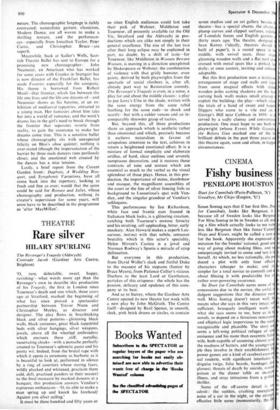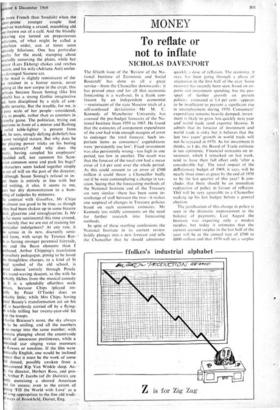CINEMA
Fishy business
PENELOPE HOUSTON
Duet for Cannibals (Paris-Pullman, 'X') Goodbye, Mr Chips (Empire, 'U') Susan Sontag says that if her first film, Du fi for Cannibals, looks like Bergman, it because all of Sweden looks like Bergm For Miss Sontag to be in Sweden at all, m ing a film which actually looks to me rat less like Bergman than like Jonas'Cornel Hugs and Kisses, might be called a turn is for the book. Apparently she expressed miration for the Swedes' rational, good se way of going about making films, and n enterprisingly invited to come and test it f herself. At which, no less rationally, she pr duced a plot with only four effect characters (cheaper to make; and a simpler for a total novice to control) and about filming it with predictable but s rather over-powering assurance.
So Duet for Cannibals earns none of t concessions due to the novice, the awful, i dulgent suggestions that the director men well. Miss Sontag doesn't mean well. S means what she says in this very intact. sufficient, brusquely intelligent work: a what she says seems to me, here as in novels, to depend on a ferocious remoten and elliptical logic impervious to the me recognisable and plausible. The story co cerns a left-wing political refugee of so eminence and his more than eccentric Pali wife, both capable of assuming almost at %i the madness of hatters, and the younger c ple they involve in their establishment. power games are a kind of cerebral-cum- ual roulette, with significant interludes disguise (wigs, false beards, bandages. da glasses), threats of death by suicide, tour poison at the dinner table or incura illness, and stray intrusions from a polit thriller.
Some of the off-centre detail is v adroit: the sudden, crashing unexplai noise of a car in the night, or the stran effective little scene (momentarily, the
more French than Swedish) when the ent-prone younger couple find Ives watching a crazed, mumbling old p thrown out of a café. And the blandly kering eye turned on preposterous iations, of what might be called a ochian order, can at times seem ately hilarious. One has particular.
pathy for the maid, stumping about ractedly removing the plates, while her toyer (Lars. Ekborg) chokes and retches reen, and his wife (Adriana Asti) smiles a deranged Siamese cat.
the maid is slightly reminiscent of the y retainer in a horror movie, never hing at the new corpse in the crypt, this perhaps because Susan Sontag (like Iris och) has a strong Gothic imaginative k, here disciplined by a style of con- ble severity. But the trouble, for me, is puny scale of her people—considered,
is, as people, rather than as counters in cruelty game. The politician, trying out nerisms in front of a mirror and flashing awful table-lighter ',a present from ht, he says, smugly defying disbelief) has some vestigial stature. But why does he er playing power tricks on his boring ng secretary? And why does the ary, having sampled his employers' padded cell, not summon his Scan- oian common sense and pack his bags?' characters seem locked together simply n act of will on the part of the director; although Susan Sontag's refusal to in- ret them is entirely in line with her I writing, it also, it seems to me, es her dry demonstration to a bam- ling of tadpoles by minnows.
contrast with Goodbye, Mr Chips s almost too good to be true, as though films had been shaken up in some bizarre tail, glycerine and nitroglycerine. Is Mr s far more sentimental this time around, it merely that we are out of training for articular indulgences? At any rate, it s across in its new, discreetly semi- ical form, with script by Terence Rat- s
. as having stronger perennial fairytale, utv and the Beast elements than I mbered. Arthur Chipping's translation crochety pedagogue, pining to be loved is thoughtless charges, to a kind of St rd symbol of the old school, is ed almost 'entirely through Petula s wand-waving descent, as the wife he obably filches from the musical comedy . It is a splendidly effortless male
ream, because Chips (played im- bly by Peter O'Toole) does so
rkably little; while Mrs Chips, having ted Beauty's transformation act on his f, is heartlessly carried off by a flying- b while trilling her twenty-year-old hit to the troops.
Leslie Bricusse's score, the sky always
s to be smiling, and all the numbers to merge into the same number, with
mera plunging about the countryside ch of innocuous prettinesses, while a bodied star singing voice murmurs
t flowers or sunshine. If the film were ntically English, one would be inclined sPeet that it must be the work of some ul dotard, possibly awoken from a r-covered Rip Van Winkle sleep. Ac- , the director, Herbert Ross, and pro- Arthur P. Jacobs (of Dr Doliule), are NY exercising a shrewd American for excess; even to the extent of fining 'Fill the World with Love' as a I song appropriate to-the fine old tradi- I Ways of Brookfield, Dorset, Eng.







































 Previous page
Previous page